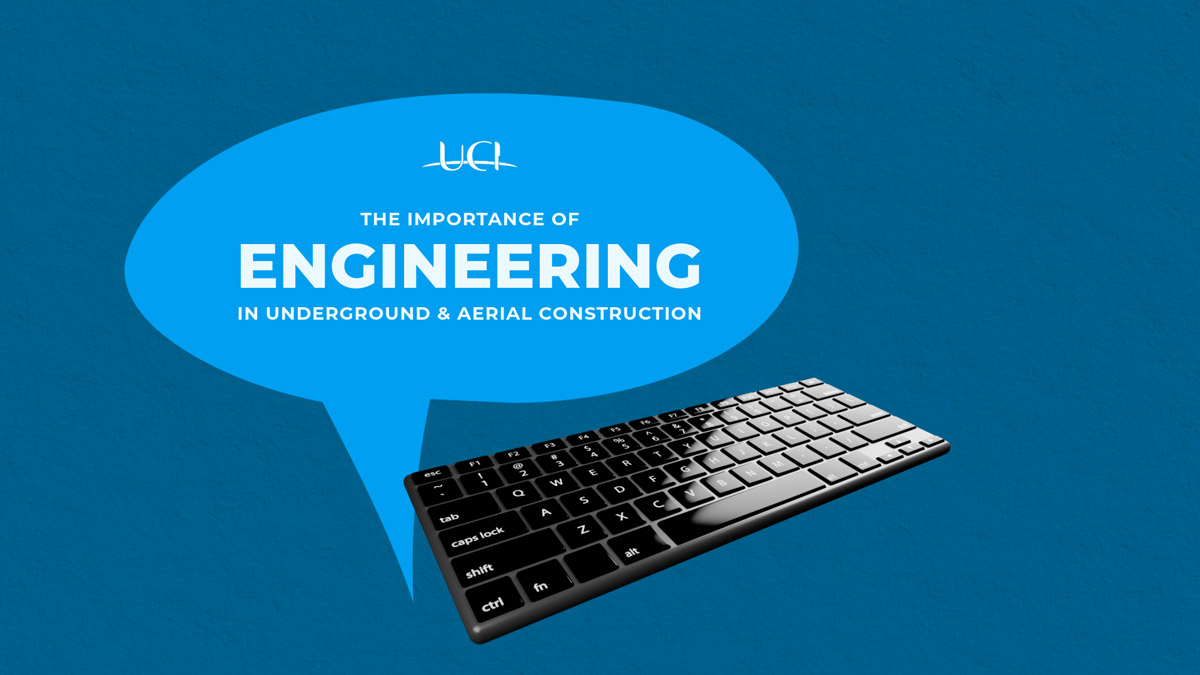There are many disciplines of engineering. There is chemical engineering, automotive engineering, and aerospace engineering, just to name a few. This career is hallmarked by employees that are expert problem solvers, tinkerers, and innovators. Blueprints and numbers aside though, engineers play a pivotal role in ensuring the safety, efficiency, and success of projects, particularly those involving underground and aerial infrastructure. From planning and design to permitting and troubleshooting, engineers are the linchpin that holds these complex projects together.
Underground Contractors, Inc. is proud to have a professional team of engineers on our roster with decades of combined experience. In this blog, we wanted to spotlight this service and detail the role that they play from start to finish of every project completed at UCI.
The Importance of Engineering in Underground and Aerial Construction
- Safety
- Permitting
- Timeliness
Engineers are involved with underground and aerial construction projects from the very start. Before trucks depart or digging starts, teams depend on engineers for clearance, permission, and permits on the job site. Engineers are often dealing with many different municipalities throughout the lifetime of a project including city, county, MDOT, drains, and airports. This is often the most time-consuming part of the project but with an experienced team like UCI’s, these decisions will be made swiftly and correctly, guaranteeing the safety and reliability of our infrastructure so that the project can move forward.
Engineering & Aerial
Above ground, during an aerial construction project, engineers ensure that telecommunications equipment can be safely placed on utility poles by verifying clearances and adhering to strict height and weight specifications per NESC 23 guidelines. This prevents hazards and ensures the smooth functioning of our network.
Engineering & Underground
Underground, during an underground construction project, engineers must adhere to specific depth requirements when laying cables. To do this, engineers will develop detailed designs that accurately pinpoint the right-of-way and intended location for fiber or cable installation per NESC 23 guidelines. These designs must also consider surrounding underground utilities, such as drains, water, and gas lines, to avoid potential damage during construction.
Engineering & Splicing
When it comes to splicing services, engineers play a crucial role in determining the appropriate number of fibers needed for splicing, preventing issues related to insufficient capacity. By ensuring accurate fiber counts and proper splicing techniques, engineers contribute to reliable and efficient network connections.
The Engineer’s Journey: From Planning to Completion
While many people associate utility contracting with our on-site foremen, the often-overlooked backbone of our projects is the dedicated team of engineers working diligently behind the scenes. As mentioned before, engineers get involved at the start of every project, often showing up on-site well before the foremen do. “We take pictures so we can refer to them when we are designing so that we do not have to continually go back out in the field. The site surveys really help us up front to get the design process going so we can complete it more efficiently.” – Joshua Engelhardt, Engineering Manager
Before Construction
First things first, engineers must complete a survey of the area, gathering the plans of the other utilities in the area before designing anything. This step is crucial to the safety and success of the project!
During Construction
With a survey of the job site complete, engineers can now create detailed designs, considering factors like utility locations, right-of-ways, and digging depths. When these designs are completed they must be submitted for review and permitting before contractors can get started.
Throughout the construction phase, engineers are available to provide technical support, addressing questions and resolving issues relating to design and instructions.
After Construction
An engineer’s work is not done until the client is completely satisfied! After project completion, engineers will head out to the job site to ensure that the work was done according to plan and to the client’s expectations.
Behind the Scenes: A Day in the Life of an Engineer
We asked one of the wonderful engineers at Underground Contractors, Inc. about a typical day in the life. No two days are the same, as UCI has multiple projects going on around Michigan on a regular basis.
“We have many different projects in many different stages, but we have surveys to do in the field, we will be at our computers designing projects and making phone calls for permitting, or contacting our customers for information we need to complete our projects.” – Joshua Engelhardt, Engineering Manager
Our engineers can either be found in-office or in the field on a local job site.
Experience Makes the Difference: Choose Underground Contractors, Inc.
Engineering is the cornerstone of underground and aerial construction projects. From initial planning to final completion, engineers play a vital role in ensuring safety, efficiency, and compliance. Their expertise and dedication are essential for delivering successful projects that meet the needs of our clients and surrounding communities.
At Underground Contractors, Inc. our expert team of engineers will give you peace of mind for the entirety of your project. With over 50 years in business, UCI is the obvious choice for those looking for a trusted utility contracting company. Head over to our website to request a quote today! Our engineering services include:
- Route selection and feasibility studies
- Design and construction schedules and cost estimates
- Environmental permitting
- Topographical survey
- Detailed aerial and buried engineering
- Pole loading analysis
- Constructability review and value engineering
- State and local permitting
- Construction administration, management and inspection
- Network documentation and management
- Outside plant Inspection services
- Complete pre-survey of manhole facilities including duct selection


